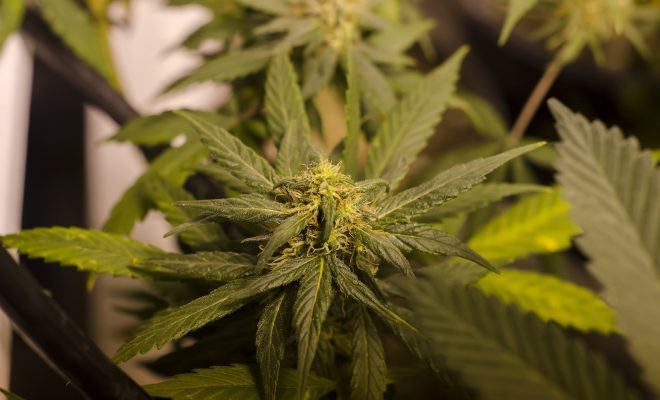 "LEGAL Colorado Marijuana Grow" courtesy of [Brett Levin via Flickr]
"LEGAL Colorado Marijuana Grow" courtesy of [Brett Levin via Flickr]
Cannabis in America
Once Marijuana Is Legal, Who Sets the Rules?
It is a foregone conclusion, less a question of if than when: marijuana will be legalized for recreational use across all 50 states. Three states–Washington, Colorado, and Oregon–have already done so. Medical marijuana is legal in 25 states and the District of Columbia. This fall, five states–including California, a heavily populated pot playground–will vote on measures to legalize the long demonized plant.
Marijuana is less stigmatized in popular culture and society than ever before. Studies of weed–though stymied due to federal classification of marijuana as a Schedule I drug, reserved for the most dangerous substances–have largely hinted at its curative properties. Weed is inevitably headed toward a legal, taxed, regulated market in the vein of tobacco and alcohol. What effects could that have on consumers? What dangers could it cause? How will consumers benefit from marijuana shifting from an unchecked black market to one that is legal and perhaps beholden to powerful interests? Law Street investigates:
The State-Level Model
In a 1932 case, Supreme Court Justice Louis Brandeis famously called states the “laboratories of democracy.” And so far, in the twilight years of marijuana legalization, states are the testing grounds for setting standards and establishing norms. Colorado and Washington were the first states to fully legalize recreational marijuana in 2012. Oregon passed a similar measure last fall. At the Brookings Institute in Washington D.C. last week, the authors of a paper on how special interest groups will shape the legal marijuana landscape presented their findings. They concluded, “the emerging model of state-level regulation provides valuable insulation against interest-group depredations.”
Philip Wallach, a senior fellow at Brookings and co-author of the paper, believes states can act as a bulwark against the potentially self-serving, damaging motivations of special interest groups, and sort through what works and what does not. During a panel discussion that followed the presentation of his paper, Wallach ticked off the benefits of a state-level model versus a federal one. A state model would “[offer] room for experimentation, limit the stakes of any misstep, and spread out the resources of interest groups, preventing them from concentrating their firepower,” he said. Decentralization, according to Wallach and his colleague Jonathan Rauch, co-author of the paper and moderator of last week’s panel, would make for a healthier and more robust legal marijuana market.
But Kathleen Frydl, a history professor at the University of California, Berkeley and author of “The Drug Wars in America, 1940-1973,” questions the ability of the state-level model to act as a decentralizing mechanism. She worries the best practices formed within states would be co-opted by interest groups regardless. Frydl argues that these groups might “then promote those best practices, or what they see as best practices, and the other states kind of fall as dominoes,” without taking statewide “indigenous concerns” into account. Interest groups would be, in effect, “ordering from a legislative menu.”
A member on one of two panels at Brookings last week and a “full-throated advocate” of legalizing marijuana, Frydl also expressed concern over the lack of watchdogs at the state level. But, she conceded, “state taxation is the principle way in which states can regulate marijuana” and regulation is “best maintained by a variety of state experiences.”
Misregulation vs. Overregulation
For Andrew Freedman, the last few years have been a “regulatory honeymoon period.” Freedman is the Director of Marijuana Coordination in Colorado, a role that did not exist until a few years ago. As the “marijuana czar” of the first state to legalize pot, Freedman has dealt firsthand with the trial and error regulatory process of marijuana legalization. He participated in both panels last week and provided insight into how easy it was for Colorado to pass new legislation to shape the rules of its growing marijuana market.
Good regulations are key to a thriving legal marijuana market, he said, but the challenge is “how to draw the line between what is overregulation and what’s running as fast as possible, as smart as possible to create a good guideline later on.” Since Colorado legalized recreational marijuana in 2012, the trailblazing state has tweaked rules and amended the initial legislation in an effort to find a regulatory sweet spot.
Originally, tourists in Colorado were only allowed to purchase seven grams of weed while residents could buy up to 28 grams. Now, both tourists and residents can purchase up to 28 grams. And after a number of incidents involving edibles and children, Colorado is lowering the concentration of THC–the compound in marijuana that has psychological effects–allowed in edibles sold for purchase. That measure will go into effect in October.
But Freedman understands the freedom to adjust and establish new norms will likely be short lived. In five years, as a legal framework is established and interest groups consolidate, he sees pushing new regulations as “day to day battles versus big pieces being moved.” A consolidated marijuana industry with increased regulations would create obstacles for new entrants and more hurdles for existing businesses. But according to Alexander Tabarrok, professor of economics at George Mason University and a member of last week’s panel, stifling regulatory measures and barriers to entry could be a good thing for the marijuana industry. “Capitalism plus an addictive drug—is this really the best combination?” he said, “maybe sometimes efficiency is not the best thing, maybe innovation in all things is not always good.”
Big Marijuana
Like the tobacco and alcohol industries before it, some experts say the marijuana industry is headed down a road of narrow interest groups and concentrated power. Big Marijuana: where rules of the road are set by only a handful of national actors. In their new paper, Wallach and Rauch conclude: “Over time, multiple interests will coalesce and colonize the regulatory process.” But Big Marijuana does not have to be an inherent evil, said John Hudak, who also presented a paper at the Brookings event. “This idea that big is always bad is wrong, and that differently sized is good is also wrong.”
Big Marijuana has its advantages, he said. Powerful actors have more to lose, and thus more incentive to play by the rules. They also have a reputation to uphold, since consumers buy into their brands and care about their actions, forcing them to act with the public’s spending power in mind. Hudak, who wrote a book called “Marijuana: A Short History,” said that big firms will also have the advantage of pairing business acumen with marijuana know-how. “Not every marijuana grower should run a business, and not every businessman should be growing marijuana,” he said.
That business acumen could come with costs, however. Freedman is concerned that as national marijuana brands accrue capital and influence, they will follow in the footsteps of tobacco and alcohol brands that market to underage users and exploit people with abuse problems. “Those who have access to capital know how to do that in a much better way than those who don’t have capital,” Freedman said. He wasn’t the only panelist who expressed caution at the exploitative potential of powerful marijuana companies. Jeff Zinsmeister, vice president of Smart Approaches to Marijuana, opposes legalizing weed because legalization would “inevitably push marijuana into a model that is constantly going to be pushing the limits when it comes to targeting children and heavy users.”
Whatever forces end up governing the legalized marijuana market–a handful of powerful brands and interest groups; a smattering of smaller, statewide actors; or something else entirely–there will be a time in the not so distant future where the entire country recognizes the drug as a legal substance. And like tobacco and alcohol before it, marijuana will pose difficult questions for society, government, and industry to answer.








Comments